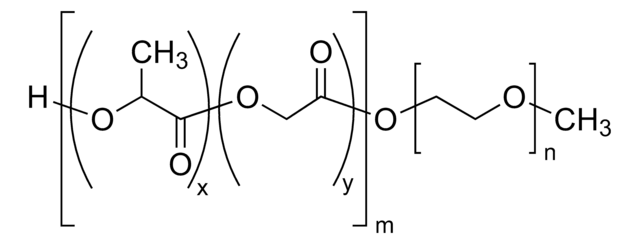570311
Poly(ethylene glycol)-block-poly(ε−caprolactone) methyl ether
PCL average Mn ~13,000, PEG average Mn ~5,000
Synonym(s):
Poly(ethylene glycol) methyl ether-block-poly(ε−caprolactone)
About This Item
Recommended Products
form
solid
mol wt
PCL average Mn ~13,000
PEG average Mn ~5,000
average Mn ~18,000 (total)
degradation timeframe
>12 months
mp
54.2-55.9 °C (lit.)
58.8-60.7 °C
Mw/Mn
<1.4
PDI
≤1.4
Looking for similar products? Visit Product Comparison Guide
Features and Benefits
Storage Class Code
11 - Combustible Solids
WGK
WGK 3
Flash Point(F)
Not applicable
Flash Point(C)
Not applicable
Personal Protective Equipment
Certificates of Analysis (COA)
Search for Certificates of Analysis (COA) by entering the products Lot/Batch Number. Lot and Batch Numbers can be found on a product’s label following the words ‘Lot’ or ‘Batch’.
Already Own This Product?
Find documentation for the products that you have recently purchased in the Document Library.
Articles
The development of drugs that target specific locations within the human body remains one of the greatest challenges in biomedicine today.
Professor Robert K. Prud’homme introduces flash nanoprecipitation (FNP) for nanoparticle fabrication, which is a scalable, rapid mixing process for nanoparticle formulations.
Humankind has utilized protein materials throughout its existence, starting with the use of materials such as wool and silk for warmth and protection from the elements and continuing with the use of recombinant DNA techniques to synthesize proteins with unique and useful properties.
Our team of scientists has experience in all areas of research including Life Science, Material Science, Chemical Synthesis, Chromatography, Analytical and many others.
Contact Technical Service






